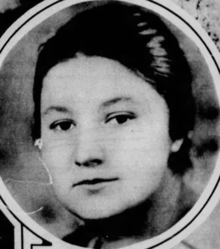| Vera Menchik | |
|---|---|
 Menchik in 1927 | |
| Full name | Vera Francevna Mencikova |
| Country | Russia (before 1928) Czechoslovakia (1930–1937) England (1938–1944) |
| Born | 16 February 1906 Moscow, Russian Empire |
| Died | 26 June 1944 (aged 38) Clapham, London, United Kingdom |
| Women's World Champion | 1927–1944 |
Vera Francevna Mencikova[1][2] (Russian: Вера Францевна Менчик, Vera Frantsevna Menchik; Czech: Věra Menčíková; 16 February 1906 – 26 June 1944), was a Russian-born Czechoslovak chess player who primarily resided in England.[a] She was the first and longest-reigning Women's World Chess Champion from 1927 to 1944, winning the championship eight times primarily in round-robin tournaments. In an era when women primarily competed against other women, Menchik was the first and only woman competing in master-level tournaments with the world's best players.
Menchik was born in Moscow to a Czech father and English mother. She began playing chess competitively in school at age 14 not long before the Russian Revolution led her family to leave Russia and move to England in 1921. She joined the Hastings Chess Club in 1923, where she began training with James Drewitt and Géza Maróczy. Menchik established herself as the best female player in the country in 1925 by defeating the British women's champion Edith Price in two matches, and then the world by winning the inaugural Women's World Chess Championship in 1927.
Menchik began competing in master-level tournaments in 1928. Following her first big success at Ramsgate in 1929 when she shared second place with Akiba Rubinstein, she was regularly invited to these elite events for the next decade, including the local Hastings Congress. Her best result in the Hastings Premier tournament was in 1931/32 when she defeated future world champion Max Euwe and Mir Sultan Khan. Late in her career, Menchik won a lone Women's World Championship match against Sonja Graf, the next-leading female player of her era. Menchik was active up until her death in 1944, when she was killed in a German air raid that destroyed her home during the Second World War.
Menchik was the dominant female chess player before the war, winning at least 59 games in a row at the Women's World Championship tournaments. Highlights of her successes against male players included two victories and a positive score against Euwe and a positive score in 29 known games against George Thomas, who received the International Master (IM) title. Master-level players that Menchik defeated were said to be members of the Vera Menchik Club, which included six players who received the Grandmaster (GM) title or the honorary equivalent. The trophy for the winning team at the Women's Chess Olympiad is named the Vera Menchik Cup in her honour.
- ^ Tanner 2016, p. 9.
- ^ Tanner 2016, p. 19.
- ^ Tanner 2016, p. 18.
Cite error: There are <ref group=lower-alpha> tags or {{efn}} templates on this page, but the references will not show without a {{reflist|group=lower-alpha}} template or {{notelist}} template (see the help page).